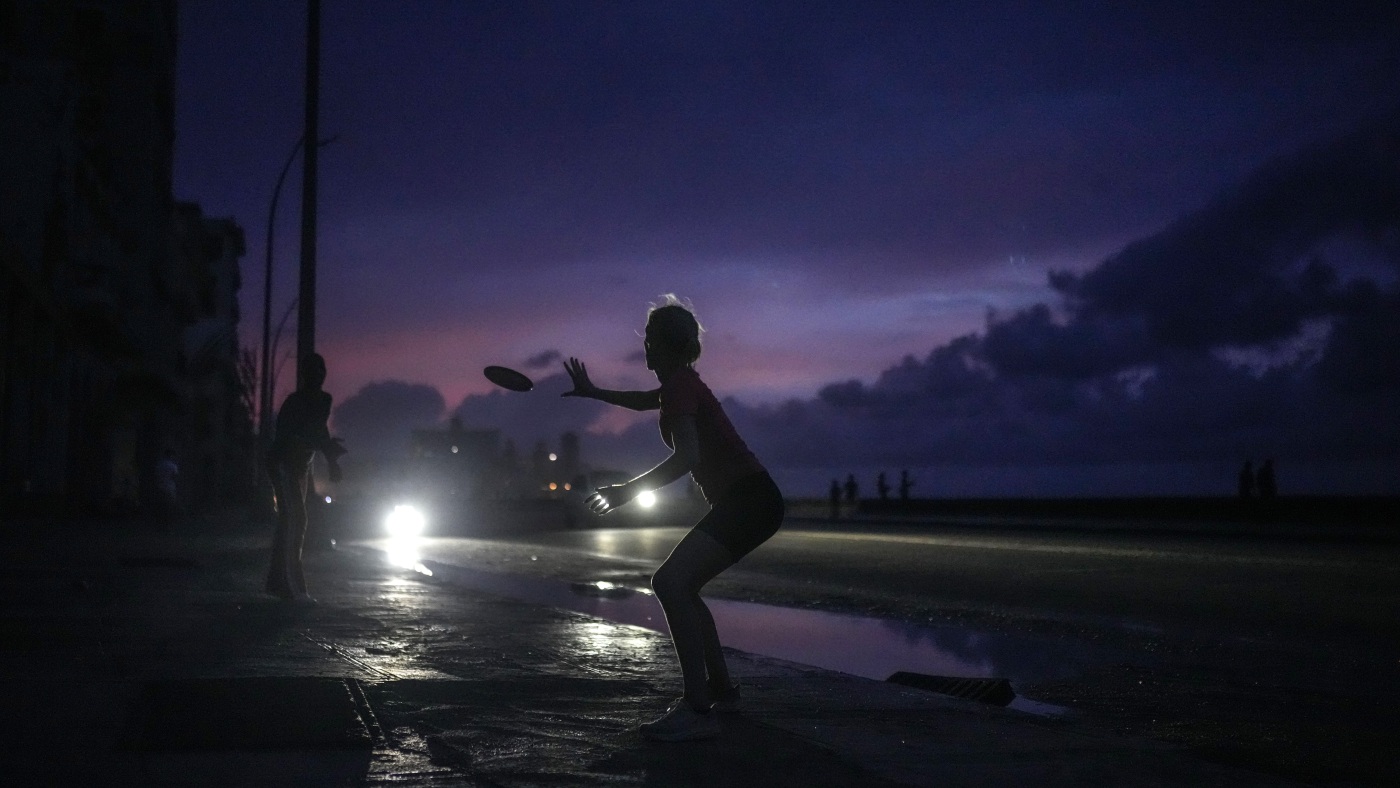
A woman prepares to catch a tossed frisbee during a massive blackout after a major power plant failed in Havana, Cuba, Friday, Oct. 18, 2024.
Ramon Espinosa/AP
hide caption
toggle caption
Ramon Espinosa/AP
MEXICO CITY – Cuba’s power grid collapsed for a second time on Saturday, shortly after Cuban officials announced they had begun reestablishing service, in what has become one of the worst crises in the country’s history.
The massive outage leaves 10 million people on the Caribbean island without electricity, and with no clear indication of when power might be restored.
It is a new low in a country that has already been dealing with a deepening economic crisis, compounded by the U.S. embargo and widespread food shortages.
The crisis began on Friday when one of the country’s largest power plants, the Antonio Guiteras power plant in the western province of Matanzas, failed shortly before midday on Friday. The failure prompted a total breakdown of Cuba’s electrical system.
Cuba’s prime minister, Manuel Marrero Cruz, blamed the problem on deteriorating infrastructure and fuel shortages exacerbated by Hurricane Milton, which has made it difficult for much-needed fuel deliveries to reach the island.

Vehicles make their way along the Malecon during a massive blackout after a major power plant failed in Havana, Cuba, Friday, Oct. 18, 2024.
Ramon Espinosa/AP
hide caption
toggle caption
Ramon Espinosa/AP
Declaring a “energy emergency,” Marrero Cruz introduced measures to reduce power use across the country—state workers were told to stay at home, and schools and non-essential industries were closed. He also sought to assuage concerns saying he expects an influx of fuel from Cuba’s state-owned oil company.
While the collapse of the electrical grid comes as a surprise, the crisis is years in the making. Cuba’s power plants are dilapidated and in desperate need of maintenance. In addition, Cuba produces very little fuel of its own, meaning it relies on imports to keep the electrical grid afloat.
The big problem for the island is that Venezuela —a political ally that for decades was Cuba’s principal provider of fuel — has slashed shipments amid its own economic crisis. Mexico and Russia have also cut exports, leaving Cuba in a vulnerable position.
For months, there have been rolling blackouts across the island, with the situation coming to a head with the failure of the power plant on Friday.
Cuba’s economy initially began tanking during the pandemic, when international tourism plummeted and inflation soared. During that same period, former President Donald Trump imposed a range of sanctions on Cuba after re-designating the country a “state sponsor of terrorism.”
Then in March, hundreds of protestors took to the streets in Santiago de Cuba, the island’s second largest city, furious over the lack of electricity and food. Cuba’s communist government — which uses a rationing system to provide a certain amount of food per household — started limiting its allocations of bread only to children and pregnant women. Some analysts say conditions are worse than the economic crisis that followed the collapse of the Soviet Union in 1991, a time known as the Special Period.
The Cuban government has long blamed its woes on decades-old U.S. sanctions that have complicated the island’s purchase of fuel and food.
While the causes of the crisis are multifaceted, the country-wide blackout is a new low for the government—and those Cubans still living on the island. Amid growing desperation, an unprecedented number of Cubans are trying to migrate to the U.S. by any means possible. The island has lost an estimated 10 percent of its population over the last three years.
